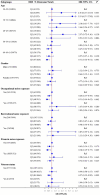Association between oxidative balance score and hearing loss: a cross-sectional study from the NHANES database
- PMID: 38812938
- PMCID: PMC11135173
- DOI: 10.3389/fnut.2024.1375545
Association between oxidative balance score and hearing loss: a cross-sectional study from the NHANES database
Abstract
Aim: The oxidative balance score (OBS), a composite score of dietary nutrients and lifestyles, reflects an individual's oxidative and antioxidant status. Evidence showed that oxidative stress levels were related to hearing loss. The relationship between OBS and hearing loss remains unclear. This study was to explore the association between OBS and hearing loss in adults.
Methods: In this cross-sectional study, data of participants aged 20-69 years who received hearing tests were extracted from the National Health and Nutrition Examination Survey (NHANES) database (2011-2012, 2015-2016). Hearing loss was defined as hearing threshold >25 dB in either ear. The OBS was composed of 16 dietary nutrients and 4 lifestyles. The covariates were screened using the backward stepwise regression analysis. The association of OBS and hearing loss was assessed with odds ratios (ORs) and 95% confidence intervals (CIs). Subgroups of age, gender, occupational noise exposure, recreational noise exposure, firearm noise exposure, and veteran status were further evaluated the associations. The importance ranking of OBS components was analyzed by the weighted random forest model.
Results: Of the total 3,557 adults, 338 (9.5%) suffered from hearing loss. High OBS levels were associated with lower odds of hearing loss (OR = 0.58, 95%CI: 0.41-0.82), after adjusting age, gender, race, hypertension, tinnitus, recreational noise exposure, and occupational noise exposure. Similar results were discovered in individuals aged50-59 years old (OR = 0.47, 95%CI: 0.24-0.93), aged 60-69 years old (OR = 0.31, 95%CI: 0.16-0.61), with female (OR = 0.44, 95%CI: 0.20-0.96), without occupational noise exposure (OR = 0.31, 95%CI: 0.16-0.62), recreational noise exposure (OR = 0.48, 95%CI: 0.30-0.76), firearm noise exposure (OR = 0.38, 95%CI: 0.19-0.77), and veteran status (OR = 0.57, 95%CI: 0.39-0.82). In OBS components, vitamin B12, total fat and physical activity were important for hearing loss.
Conclusion: Elevated OBS may be associated with hearing health in adults. Appropriate vitamin B12 supplementation, reduction of total fat intake, and increased physical activity may be beneficial to the prevention of hearing loss.
Keywords: NHANES database; association; cross-sectional study; hearing loss; oxidative balance score.
Copyright © 2024 Zhou and Han.
Conflict of interest statement
The authors declare that the research was conducted in the absence of any commercial or financial relationships that could be construed as a potential conflict of interest.
Figures
Similar articles
-
Association of oxidative balance score with hearing loss and tinnitus: NHANES 1999-2018.Front Nutr. 2024 Jun 19;11:1421605. doi: 10.3389/fnut.2024.1421605. eCollection 2024. Front Nutr. 2024. PMID: 38962438 Free PMC article.
-
Association between chronic kidney disease and oxidative balance score: National Health and Nutrition Examination Survey (NHANES) 2005-2018.Front Nutr. 2025 Jan 3;11:1406780. doi: 10.3389/fnut.2024.1406780. eCollection 2024. Front Nutr. 2025. PMID: 39830066 Free PMC article.
-
Oxidative balance score is associated with increased risk of sarcopenia and sarcopenic obesity in non-elderly adults: results from NHANES 2011-2018.Nutr Metab (Lond). 2025 Mar 11;22(1):23. doi: 10.1186/s12986-025-00914-3. Nutr Metab (Lond). 2025. PMID: 40069772 Free PMC article.
-
Association between oxidative balance score and metabolic syndrome and its components in US adults: a cross-sectional study from NHANES 2011-2018.Front Nutr. 2024 Mar 13;11:1375060. doi: 10.3389/fnut.2024.1375060. eCollection 2024. Front Nutr. 2024. PMID: 38544757 Free PMC article.
-
Association between oxidative balance score and kidney stones: data from the national health and nutrition examination survey (NHANES).BMC Nephrol. 2024 Jun 3;25(1):190. doi: 10.1186/s12882-024-03607-w. BMC Nephrol. 2024. PMID: 38831279 Free PMC article.
Cited by
-
The negative linear relationship between oxidative balance scores and constipation: a cross-sectional study from NHANES 2005-2010.Front Med (Lausanne). 2024 Nov 15;11:1471343. doi: 10.3389/fmed.2024.1471343. eCollection 2024. Front Med (Lausanne). 2024. PMID: 39618815 Free PMC article.
-
Age-dependent association between lifestyle oxidative balance score and bone mineral density in children and adolescents: evidence from the NHANES 2015-2018.Front Physiol. 2025 Jul 4;16:1618996. doi: 10.3389/fphys.2025.1618996. eCollection 2025. Front Physiol. 2025. PMID: 40688398 Free PMC article.
-
Association between oxidative balance score and lung function and FeNO and mortality in the US population.BMC Pulm Med. 2025 Apr 8;25(1):164. doi: 10.1186/s12890-025-03626-9. BMC Pulm Med. 2025. PMID: 40200238 Free PMC article.
-
Antioxidant-rich diets and glaucoma prevention: Insights from dietary oxidative balance scores in NHANES 2005-2008.Eye (Lond). 2025 Jul 8. doi: 10.1038/s41433-025-03911-1. Online ahead of print. Eye (Lond). 2025. PMID: 40629038
References
-
- World Health Organization . World report on hearing. Geneva, Switzerland: World Health Organization; (2021).
-
- National Bureau of Statistics of the People’s Republic of China . The Main data bulletin of the second National Sampling Survey for the disabled (Number 2). Available at: http://www.gov.cn/fwxx/cjr/content_1308391.html. Accessed 5 Jan 2020.
LinkOut - more resources
Full Text Sources
Miscellaneous




